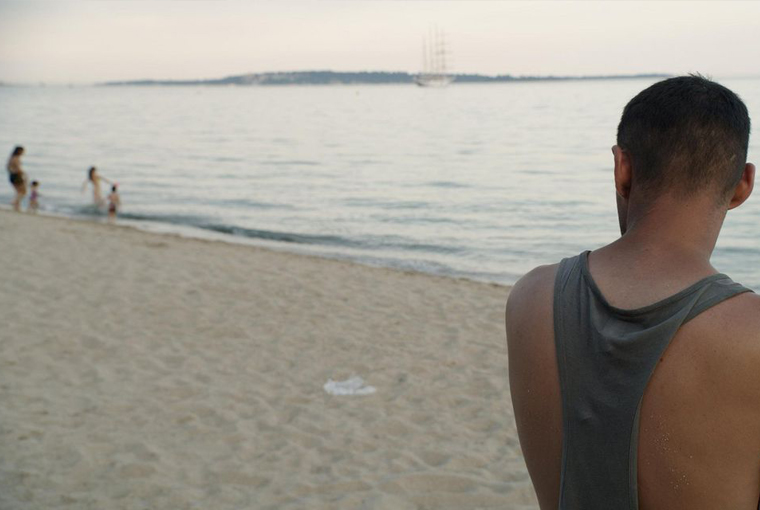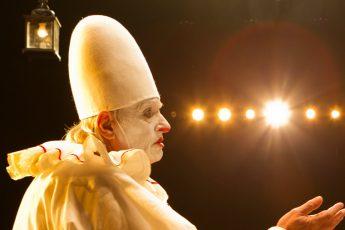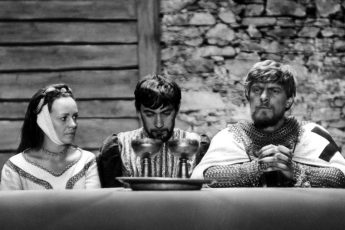
Do we lead Fate, or is it Fate that leads us? How many carefully-laid plans have failed, and how many will fail! How many senseless projects have succeeded, and how many will succeed!”
This quotation, which appears in the title sequence of Czech film Skokan (2016), is from the 18th-century French novel Jacques le fataliste et son maître by Enlightenment author Denis Diderot. Czechoslovak authors have often been attracted to this novel – in 1971 Milan Kundera wrote a ‘variation’ on the original in the form of a three-act play. In his 1975 introduction to the work, Kundera wrote that he was drawn to the novel during the Russian occupation, when the spirit of the post-Renaissance West seemed “nowhere more concentrated than in the feast of intelligence, humour, and fantasy that is Jacques le Fataliste“1. Like Kundera, Václav now lives in France. He often shoots films in Western Europe and most of his films are co-productions with Western European countries. The filmmaker’s choice to anchor his work in the philosophical musings of Diderot allows us to read the film as a modern variation on the novel. But while Jacques the fatalist believes that everything is “written down in heaven”, the main character in Skokan steadfastly believes himself to be the master of his own fate.
So what does Diderot’s “senseless project” refer to in the context of this film? Here we have a Czech gypsy (Julius Oracko), nicknamed Skokan, who is freed from prison and finds himself at a loose end – reluctant to return to selling drugs and the endless cycle of prison, freedom, prison. What’s more, he’s in love with Aneta (Klaudia Dudová) who, he’s been told, has turned to sex work in neighboring Western countries. So when he hears that an unemployed policeman has gained recognition as an actor at the Cannes film festival, he decides to launch a similar career for himself and travels to the South of France. Skokan and Jacques are thus both masculine narrations of a journey which feature numerous stories about sex and love with women.
To the viewer, Skokan’s trip to Cannes is obviously a pipe dream, not least because of Skokan’s background. When he sets off to hitchhike to Cannes he writes the name of that city phonetically on a makeshift sign – “Kan”. Indeed, watching Skokan sometimes becomes almost voyeuristic. But the smugness of cultural dominance quickly becomes a trap. The pleasure of watching a gypsy out in the world, stumbling over problems, is taken a little too far when he asks if Belgium is in the same time zone as the Czech Republic. We are often made to laugh, and then in the next scene, made to feel guilty for laughing.
Once he arrives in Cannes, Skokan gets hold of a boom-box through which he ekes out a living, singing gypsy songs of love and angst on the beachside boulevards of Cannes and in the nearby towns of Italy as people wander past, chatting on their mobile phones. Václav and his DoP Štěpán Kučera prove to be masters of the harried street shot.
Further “senseless projects” surround the film. First there is a project that was necessitated by the feature itself: getting permission to take the main character (Julius Oracko) out of a Czech jail in order for him to play the lead. Having already played in the director’s past two films, Oracko’s real-life experience, as well as his on-screen presence, made him an ideal choice for this role. Then there’s the making of the film, a semi-improvised road-trip produced without the carefully-laid plans of a completed script or big budget. A sub-plot involving the Italian mafia, whom Skokan corrals into helping him find the woman he loves, was invented on location when the crew met this highly eccentric group of people.
Another opening title announces that in prison slang, the word “Skokan” means a jumper or a frog. This nickname of our protagonist reflects his resilience in the face of troubles, but while in jail the goal is survival, in real life, Skokan has bigger plans for himself. We don’t know whether Skokan believes in Fate or not, but we do know that he believes in God. He wears a big cross around his neck, slips in and out of churches, caresses statues of the Madonna. He seems to believe that if he were a little more determined – if he prays hard enough, if he had one more lottery card – he might just be successful. Jacques, on the other hand can be read as a not-so-subtle criticism of the Church. Jacques believes that everything is already written, so he doesn’t run from danger. Prancing along on his horse, he avoids death by mad chance in the plot-line. By reading Skokan alongside Jacques le fataliste, we can set aside the question of strict Christianity, and wonder more generally to what extent the decisions we take determine what will happen to us in the end, or indeed whether they can change anything at all. Is the good-for-nothing protagonist the master of his fate, or is he just a product of social determinism and of his character?2
These ideas are explored throughout the film – often through symbolism. Skokan is shown to be a slave to his own optimism. He takes the little money he has and spends it all on lottery scratch cards. The camera shows him from a high angle – toiling over the last one of a stack – desperate almost to the point of tears. When he doesn’t win he asks the shopkeeper for another card: “I’ll pay you back”. In his magical thinking, if he gets one more card, he’ll win. When he asks the shopkeeper for a glass of water, he is thrown out of the shop – the mutterings from behind the counter remind us that lottery is seen by many as a callous waste of money. Skokan returns home empty-handed telling his drug dealing friends that he spent all the coffee money on scratch-cards.
In his novel, Diderot makes many references to the fact that someone is making the character’s decisions for them. Likewise, in Skokan it is not God making the decisions about whether he’ll win or lose, but a scriptwriter (also Václav). Everyone knows that a character in a film is much more likely to win the lottery than a person in real life – seemingly scriptwriters are more generous than God. But here, more realistically, Skokan is not made to win. His confidence sometimes allows him to lead Fate, but there are limits to his freedom; caste and class are forces of Fate that lead him right back again.
What about women’s fate in this story? Let’s not forget that Skokan’s grand project, devised in his guileless optimism, is centered on a woman, and is to prove to Aneta that he is worthy of her by becoming a star in Cannes. But in Skokan‘s world, it seems that women are not masters of their own fate – they are there to be discussed and dreamed about. Their characters are either potential lovers or children, like the imaginary ghosts of women (his daughter and Aneta) who haunt Skokan during his wanderings. As in Václav’s last two films, nearly all the female characters are either prostitutes or dream of entering the profession. It’s hard to tell whether this is supposed to be seen as criticism of Roma society or just as a fact of life.
The women never tell their own stories. We know next to nothing of Aneta – only that when Skokan heroically “buys” her back from the sex trade, employing the Italian mafia to track her down, she keeps turning the occasional trick so that they have enough money. We know this from the wads of cash that she flashes when walking down a shadowy hallway – her scantily-clothed body highlighted against the darkness. The stories seem incomplete…
In another scene, Skokan and his friend catch a wayward young prostitute who they want to take back to her family. The two men sedate her writhing body into submission on a bed, her body wracked with sobs, forcing pills down her throat until she falls asleep. Then Skokan’s friend – an ex-pimp – tells our hero the story of his ‘redemption’ about how a shocking experience reminded him that women are people too – an implausible tale of woe about his transformation from pimp into a noble gangster who brings girls back to their families or husbands. All the while, the camera pans slowly up the girl’s near-naked adolescent body until it rests on her young face which is a mess of youthful acne. The juxtaposition of what the ex-pimp is saying – his realization of the humanity of women – and what is being shown – the female body as an ‘object’ -, is jarring to say the least.
This unnamed girl does not create her own fate, and it seems that what is to become of her is a moot point. Václav shows that because this teenager is a prostitute, her body is not her own. What this seems to suggest is that because she sells her body for sex, her “no” is worth even less than the average woman’s “no”. The hypocrisy of showing a naked teenager in this lascivious way while two men discuss their moral high ground is even more disturbing than if they were to have assaulted her.
As is the case in a novel, the storytelling in this film is mostly anchored in words and language. Skokan gets into tricky situations because he can’t speak French, though at times his efforts to be understood endear him to the people he meets. A grey-haired Frenchman earnestly explains the merits of French cheese and saucisson to an uncomprehending Skokan, who nods his head and wolfs down his food steadily. A priest gives him advice in an informal confessional scene, though neither can understand the other. There’s an unforgettable scene with a pedagogical pimp and a dictionary. What we hear and see in Skokan constantly reminds us that language is power. But women rarely speak in the film. They scream and they giggle, but most of the time they remain silent. In Cannes, there is a sex scene in which the protagonist thrusts into a woman whose face we never see. Even in 2017, it’s confusing to watch a film which claims to question racism but doesn’t hesitate for a second to question our culture’s misogyny. A lesson might have been learned from Diderot, in which it is a woman who relates to Jacques and his master the classic story of Mme de la Pommeraye and the Marquis des Arcis, a tale in which both violence and hypocrisy are renounced.




Leave a Comment